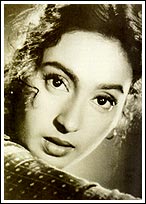
HOME | MOVIES | FEEDBACK |

Dinesh Raheja
Bhara ho pet toh sansar jhagmagata hai
True to these lines from one of its songs, Seema brings onscreen a drama so agonisingly human in its depiction of an orphan girl on the seema (borderline) between hope and delinquency, life and death, morality and immorality.
The first ever tour de force from Nutan, then herself in the cusp between girlhood and womanhood, Seema was directed by Amiya Chakravarty (who in his previous effort, Patita, handled one of the most subtly presented rape scenes in Hindi films). Chakravarty also succeeded in weaving into Seema's narrative the May-December romance between Balraj and Nutan with utmost delicacy and sensitivity.
The film's early portions depict little orphan Gauri's (Nutan) ill-treatment at the hands of her uncle and aunt, and are like several Victorian tales. Gauri finds no peace even in her job as a maid where she has to appease a foul-tempered malkin (mistress) and fend off the advances of a male domestic.
Subtlety is not particularly conspicuous in the early parts of the film. The venom-spewing aunt's role especially is tarred in broad strokes of unshaded black.
Thankfully, Nutan's character is never less than endearing in her struggle to retain a small pocket of grace amidst the harsh realities of her life. This is beautifully depicted in her friendship with another societal reject Chhotu, and her amity with some bedraggled streetchildren.
It is best exhibited when, after being falsely accused of theft, Gauri is thrown out of her job and her home. Starved for two days, Gauri is watching some streetsingers perform when a coin flung at them falls unnoticed at her feet. Desperate, she stealthily covers the coin with her foot. But at the last minute, morality reasserts itself.
When Gauri spots the domestic who framed her for theft earlier, she angrily tries to beat him up, but is deceived by his tender
words --- only to be eventually handed over to the police. Totally distrustful of the human race now, Gauri is sent to a correction
house in a catatonic state.
Though rude and defiant, Gauri fails to anger the ashram's serene head (Balraj Sahni). He may have a heart ailment and walk with the
help of a stick but Babuji, as he is called, has the strength of his convictions. But even his sympathetic words are not enough balm for Gauri's troubled soul. She makes the fur fly by getting into a hissing-scratching catfight with another inmate Putli (Shubha Khote), and by rebels against the superintendent.
The ashram's loving efforts to break her hunger strike thaws Gauri, but she is still obsessed with the idea of extracting revenge on her fomer tormentor. Gauri escapes but finds herself intractably drawn back to the ashram where Babuji's belief in her innocence and his trapping of the bully finally melts all her resistance.
The redemption of Gauri is complete as she learns to love life and find her self-worth. But her turbulent rites of passage into
adulthood also see her falling in love with the ashram's head, whom she has come to hero-worship.
You do intially wonder at the propriety of the Balraj Sahni-Nutan relationship because, after all, she was in his care at the ashram.
In real life too, he was over 20 years older to her. But Chakravarty handles the gradual build-up of their unspoken love with gentle care. The ailing, middle-aged Sahni is also shown to react violently against the notion at first.
When Nutan claims, "Main jaanti hoon mera kaunsa ghar hai, aur mujhe kaun sahara chahiye," he angrily protests, "Tum khandaron mein apna ghar banana chahti ho."
Sahni has his own lesson in life to learn and the story dovetails into a soft ending after a well-wisher cautions Balraj, "Hazaaron aadmi ko zindagi se ladna sikhaya; ab khud hi bhaag rahe ho!"
The unloved Nutan's gradual learning of the ability to accept kindness is also well brought out. A poignant moment is when a young child is sent to convince the rebellious Nutan to break her hunger strike and Nutan remembers Chhotu --- probably the
only person who apportioned some loved for her. It parts the mists of resentment clouding her head, even if only temporarily.
The message that love can overcome grievous wounds is beautifully captured in the songs Tu pyar ka saagar hai and Kahan jaa raha hai.
Shubha Khote as the peppy ashram inmate who heckles Nutan with Kya baat hai is a delight. A real-life cycling champ, she also has an elongated sequence where she chases a thief on a speeding bicycle. Gifted a sewing machine, she reforms, saying, "Aaj tak main logon ki jeb kaatti rahi; ab seene ki koshish karoongi." This subplot is not extraneous as it serves to show Nutan the possibilty of redemption.
Balraj Sahni commands amazing authority and unstinting dignity.
Nutan is unforgettable in the scenes where she rages against the world in the ashram with unshed tears and the agonising fires of disillusionment blazing in her eyes.
Sidelights:
Music:
You might also want to read:
|
|||||||||
© 1996 - 2002 rediff.com India Limited. All Rights Reserved. |
||||||||||